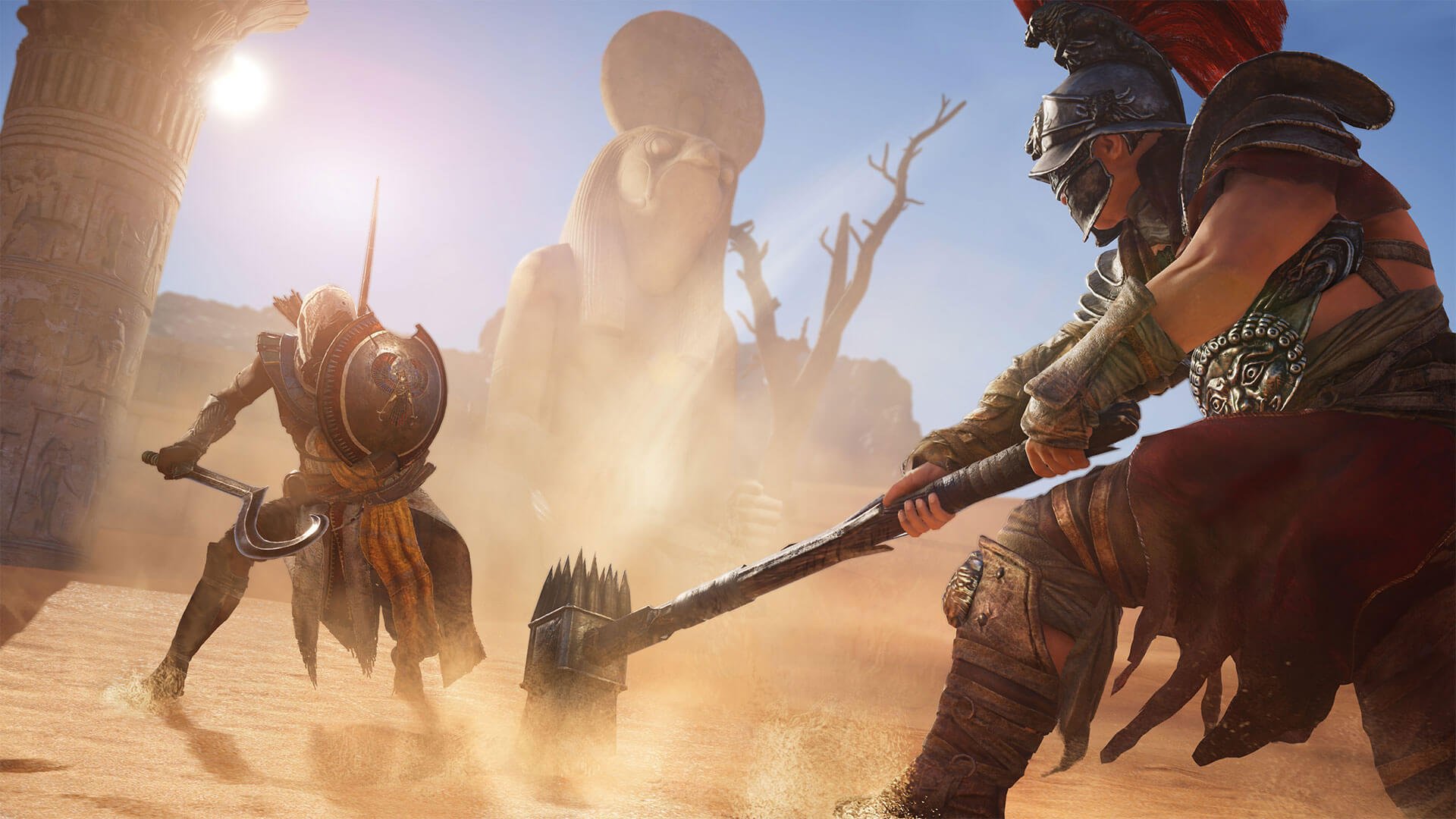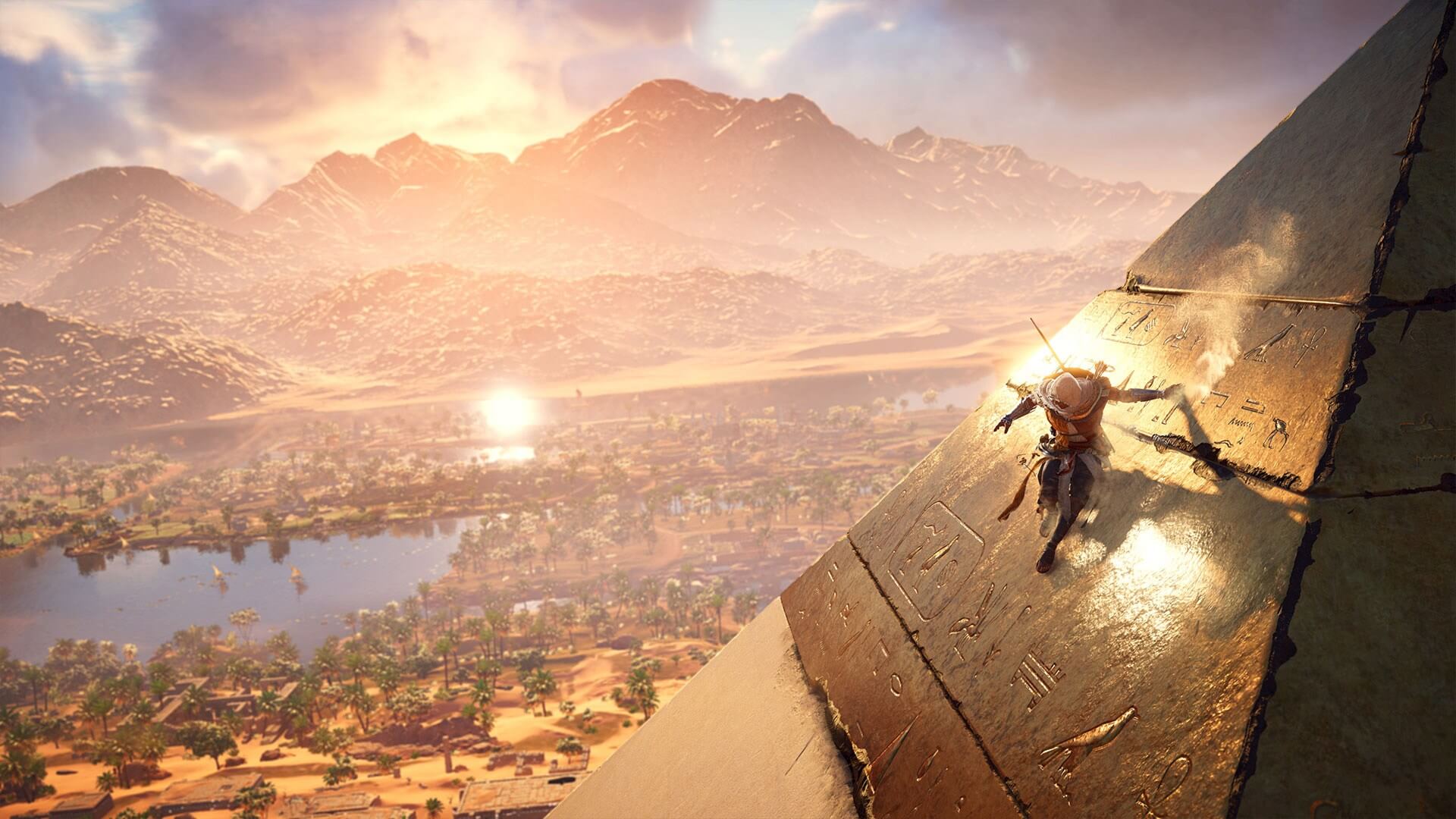Title: Assassin’s Creed: Origins
Available On: PC, PS4, Xbox One
Developer: Ubisoft
Publisher: Ubisoft
Genre: Action-adventure
Official Site: https://assassinscreed.ubisoft.com/game/
Release Date: October 27, 2017
Where To Buy: Steam, Playstation Store, Xbox Marketplace
After a lackluster sales performance from Assassin’s Creed: Syndicate, Ubisoft took a year off to fine tune the series and take a new, revised approach. Many have looked forward to the return of the franchise, hoping that it mended the problems that began with Assassin’s Creed III and culminated in the technical issues of Assassin’s Creed: Unity. Finally, they have returned to deliver another entry into the franchise, hoping that it lives up to the expectations of their fans.
Assassin’s Creed: Origins is the latest entry in the Assassin’s Creed franchise developed and published by Ubisoft studios. You play as Bayek of Siwa, and occasionally his wife Aya, in ancient Egypt during the time of Greek and Roman occupation. Bayek, a Medjay and protector of Egypt, is sent down a path of revenge after his son is killed in front of him by a mysterious group of masked individuals working from a place of power. After some years, he returns to Siwa to begin his endeavors, regrouping with old friends before heading out to enact out his plots.
You leave Siwa and head towards the larger towns containing your enemies, and this is where the game truly opens up to you. What appeared at first to be a smaller, more linear approach immediately expands to contain one of the largest worlds every approached by the series. With a mix of a number of towns, both small and massive, as well as expanses of deserts and seas, the world that is presented in Assassin’s Creed: Origins is truly one to behold. Each area of the game feels distinct based on its geographical placement and the culture in charge of that area. Egyptian towns are generally less wealthy and ornate, while the Roman and Greek cities are massive and decorated with art and architecture.
Alongside of this, the game also does a great job of differentiating the various groups. The Egyptians in the game are far more traditional and follow a more conservative code of conduct, while the Greco-Roman areas are far more liberal and “advanced”. The culture of these areas also influences how people treat you, meaning your Egyptian stature can often influence whether you’re looked down on or not depending on where you are. The structures you’d expect are all present: the beautiful library of Alexandria, the great pyramids of Giza, the various temples to gods of all cultures. Assassin’s Creed: Origins does an excellent job of making you feel truly apart of this ancient world.
It is worth noting that though this world Ubisoft created is incredibly detailed, it’s not a huge advancement in the technical aspect. Most of the game, including the vast majority of the cutscenes not pertaining the main quest, is not a huge improvement from the previous entries in the series. Much of the conversations with random NPCs look fairly average, and while the scope of the game is massive, it does carry with it a number of technical glitches, including ones that cause the game to crash.
The game also takes a newer approach to combat, one that fixes much of the problem in the previous games– feeling overpower. Combat encounters are much more difficult, as instead of just being able to easily parry any attacks coming against you, you have to time your attacks correctly and try to gain advantage through stealth and tactics. If you’re surrounded by more than three people, you’ll quickly find yourself overwhelmed and having to quickly to run. Instead, the game gives you all the tools to do recon on your objectives, mark target for tracking, use the environment to your advantage, and stealthily take out as many enemies as you can using your bow from a distance.
It also allows you to upgrade yourself the way you want to. Using three different branches for an upgrade tree, divided between your bow, your melee weapons, and your tools, Assassin’s Creed: Origins gives you the ability to put your focus where you want it. Even at level 40, the level cap, you won’t maximize all the areas. Instead, you need to find what you want to specialize in and capitalize on it. All of this upgrading seems strange for an assassin, but it makes sense given the story of Bayek and his journey.
The main storyline of the game is where you’ll find the most value. Though the story of Assassin’s Creed has never been anything emotion invoking or profound, Assassin’s Creed: Origins does an excellent job of having enough “Wow” moments to keep pushing you farther. In fact, the farther you get into the game, the more these moments occur, leading to a truly excellent ending that helps explain the true origins of the assassins and their guild.
Unfortunately, this excellence doesn’t carry over to the side quests. The game requires you to grind a bit between side quests and hunting for crafting materials in order to level for some of the main quests. The problem is that these side quests are mostly broken up between escorting people from point A to point B or fighting bandits and soldiers in a fort before carrying someone out who lacks the ability to walk until you set them down, upon which they stand and walk away fine. This becomes incredibly repetitive and boring over the course of the game.
Verdict: While the game is not necessarily as beautiful as I expected it to be, its scope, story, and combat are definite improvements on the series. Assassin’s Creed: Origins does an excellent job of keeping you pushing forward for more, and the story definitely rewards this with plenty of cool moments. The year off has definitely done the series good, and it’s a game I’d recommend playing.
[review]




